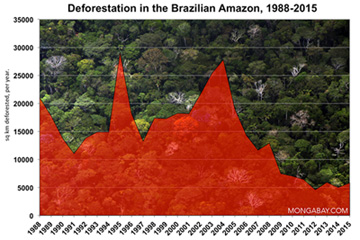Brazil asks rich countries to fund Amazon rainforest conservation
Brazil asks rich countries to fund Amazon rainforest conservation
mongabay.com
August 2, 2008
Brazil makes it clear that it will not tolerate any foreign influence on its Amazon policy
Brazilian President Luis Inacio Lula da Silva officially unveiled plans to raise billions of dollars for protecting the Amazon rainforest.
The fund, which was originally announced several months ago and will be administered by the national development bank, aims to raise $21 billion in foreign donations by 2021. Contributors will not be eligible for carbon credits that may be generated by reductions in deforestation, but the money will go towards sustainable development and conservation initiatives in the region. Silva did not say how much of the Amazon would be protected under the plan.
The move is seen as a way for Brazil to shore up its Amazon conservation efforts without giving up control in the region. The initiative would help deflect criticism over the country’s high rate of deforestation: Brazil accounted for half of global tropical forest loss between 2000 and 2005.

|
“It’s better for the country’s image to do things right, so we can walk in international forums with our heads high,” Silva said, leaving blunter words for Roberto Mangabeira Unger, the minister for strategic affairs.
“The fund is a vehicle by which foreign governments can help support our initiatives without exerting any influence over our national policy,” he said. “We are not going to trade sovereignty for money.”
While the fund has been criticized by some observers for relying on donations rather than market mechanisms for avoiding deforestation, Brazil is effectively asking industrialized countries to put their money where their mouth is. Environmental groups and governments in Europe and the United States have long blamed Brazil for its high rate of deforestation, without offering much in the way of assistance to help slow forest loss. In fact policies in the West, along with consumer demand for products produced on forest lands, are key drivers of rainforest destruction in Brazil. Failure to pay into the new fund would likely undermine any future Western criticism on Brazil’s environmental performance. Norway has already said it would be willing to pay hundreds of millions of dollars per year for rainforest conservation.
Brazil is home to more than 60 percent of the Amazon rainforest, Earth’s largest tropical forest. The Amazon is estimated to hold around 90-140 billions tons of carbon, but forest loss results in millions of tons of emissions annually. When carbon dioxide produced by deforestation are taken into account, Brazil is the fourth largest emitter of greenhouse gases after China, the United States, and Indonesia. Overall about 70 percent of the country’s emissions result from land use change.
In recent years, deforestation in the Brazilian Amazon has increasingly moved in step with soy and cattle prices: as prices surged to near record levels in the second half of 2007, forest clearing about doubled over the previous year.







